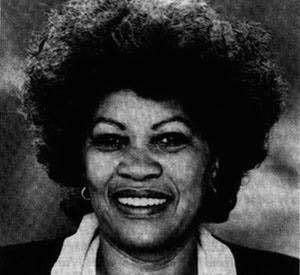Biographical Information on Toni Morrison


Personal
- Toni Morrison's birth name was Chloe Anthony Wofford.
- She was born in Lorain, Ohio on February 18, 1931.
- She is the daughter of George and Ramah Wofford (Morrison is the
second of four children).
- She married Harold Morrison, a Jamaican architect, in 1958 and was
divorced in 1964.
- She has two children who are Harold Ford and Slade Kevin.
Education
Career
- Texas Southern University, Houston, instructor in English, 1955-57.
- Howard University, Washington, DC, instructor in English, 1957-64.
- Random House, New York, NY, senior editor, 1965-85.
- State University of New York at Purchase, associate professor of English, 1971-72.
- State University of New York at Albany, Albert Schweitzer Chair in the Humanities, 1984-89 .
- Princeton University, Princeton, NJ, Robert F. Goheen Professor in the Council of the Humanities, 1989-
Novels and Plays
Awards and Honors
- Sula
- Song of Solomon
- Beloved
- New York State Governor's Arts Award, 1986
- First recipient of the Washington College Literary award, 1987
- National Book Award nomination, 1987
- National Book Critics Circle Award nomination, 1987
- Pulitzer Prize for fiction, 1988
- Robert F. Kennedy Award, 1988
- Elizabeth Cady Stanton Award from National Organization for Women
- Nobel Prize for Literature, 1993
Activities
- Morrison is the trustee of the National Humanities Center.
- She co-chairs the Schomburg Commission for the Preservation of Black Culture.
- She is a member of American Academy and Institute of Arts and Letters, American Academy of Arts and Sciences, National Council on the Arts, Authors Guild (member of council), Authors League of America.
- Toni Morrison is a member of Alpha Kappa Alpha Sorority, Incorporated. She pledged Alpha Chapter at Howard University.
Quotations by Toni Morrison
- When Morrison was asked if she believed in ghosts, she replied, "Yes. Do you believe in germs? ... [Without ghosts] I would have been dependent on so-called scientific data to explain hopelessly unscientific things"
- "The problem I face as a writer is to make my stories mean something. You can have wonderful, interesting people, a fascinating story, but it's not about anything. It has no real substance. I want my books to always be about something that is important to me, and the subjects that are important in the world are the same ones that have always been important."
- "I look very hard for black fiction because I want to participate in developing a canon of black work. We've had the first rush of black entertainment, where blacks were writing for whites, and whites were encouraging this kind of self-flagellation.
Now we can get down to the craft of writing, where black people are talking to black people."
- "I am from the Midwest so I have a special affection for it. My beginnings are always there [Ohio] ... No matter what I write, I begin there ... Ohio also offers an escape from stereotyped black settings. It is neither plantation nor ghetto."
- "I really think the range of emotions and perceptions I have had access to as a black person and a female person are greater than those of people who are neither.... My world did not shrink because I was a black female writer. It just got bigger."
Critical Reviews
- "Like all the best stories, [Morrison's] are driven by an abiding moral vision. Implicit in all her characters' grapplings with who they are is a large sense of human nature and love--and a reach for understanding of something larger than the moment"
-- Jean Strouse (Newsweek).
- "[Morrison's novels] explore in particular the process of growing up black, female and poor. Avoiding generalities, Toni Morrison concentrates on the relation between the pressures of the community, patterns established within families, ... and the developing sense of self" -- Jennifer Uglow (Times Literary Supplement).
- "The word 'elegant' is often applied to Toni Morrison's writing; it employs sophisticated narrative devices, shifting perspectives and resonant images and displays an obvious delight in the potential of language" -- Jennifer Uglow (Times Literary Supplement).
- "[Each of Morrison's novels] is as original as anything that has appeared in our literature in the last 20 years. The contemporaneity that unites them--the troubling persistence of racism in America--is infused with an urgency that only a black writer can have about our society" -- Charles Larson (Chicago Tribune Book World).
- "Vivid dialogue, capturing the drama and extravagance of black speech, gives way to an impressionistic evocation of physical pain or an ironic, essay-like analysis of the varieties of religious hypocrisy" -- Margo Jefferson (Newsweek).
- "Toni Morrison is an important novelist who continues to develop her talent. Part of her appeal, of course, lies in her extraordinary ability to create beautiful language and striking characters. However, Morrison's most important gift, the one which
gives her a major author's universality, is the insight with which she writes of problems all humans face.... At the core of all her novels is a penetrating view of the unyielding, heartbreaking dilemmas which torment people of all races" -- Elizabeth B.
House (Dictionary of Literary Biography Yearbook).
- "[Morrison] works her magic charm above all with a love of language. Her ... style carries you like a river, sweeping doubt and disbelief away, and it is only gradually that one realizes her deadly serious intent" -- Susan Lydon (Village Voice).
From "Toni Morrison," Contemporary Authors, Gale Research, 1993.

Mail your comments to:






